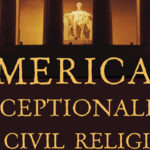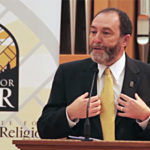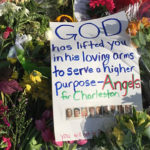Posted: 12/05/03
'Nones' aren't the loneliest
number when it comes to religion
By Mark O'Keefe
Religion News Service
PORTLAND, Ore. (RNS)–Their numbers have more than doubled in a decade, to nearly 30 million. Organized as a religious denomination, they would trail only Catholics and Baptists in members.
They are the “nones,” named for their response to a question in public opinion polls: “What is your religion, if any?”
Some nones are atheists, others agnostics, still others self-styled dabblers in a variety of faiths and philosophies. Despite their discomfort with organized religion, many consider themselves quite spiritual.
 |
| Matt Blevins, 30, of Portland, Ore., has experienced spiritual moments camping, biking and skiing in the Pacific Northwest, where "nones," those professing no religion, outnumber any single religious category. (Kraig Scattarella/RNS Photos) |
Take, for example, Matt Blevins, 30, a Portland, Ore., environmentalist who, like many nones, is relatively young, liberal and religiously uncommitted. Sunday morning service? Blevins defines that as an attentive waiter at brunch.
“I think I was baptized Episcopalian, but I'm not quite sure,” Blevins said. “I try to put those things out of my mind. I just don't buy most of the stuff from organized religion. For the most part, it provides more problems than solutions.”
Blevins' cathedral is the great outdoors. While camping, biking and skiing, he has had experiences that can only be described as transcendent, he said.
“For me, those moments are just as moving as what people may experience when they go to revivals. I'm taken to a different place where I have a bigger perspective on life and the universe and everything. If that's a spiritual connection, I'll take it.”
Nones are especially prevalent in the Pacific Northwest. In Oregon and Washington, where 21 percent and 25 percent, respectively, claim no particular faith, nones outnumber any single religious category.
“If people are interested in hiking on Sunday morning rather than going to church, that's fine. The culture won't say that's unacceptable. In fact, the culture will say that's perfectly acceptable,” said Mark Shibley, a sociologist at Southern Oregon University who has studied and written about nones.
But the religionless might find some parts of the country less tolerant.
Lauren Windle of Indianapolis grew up as an atheist in New York City, where most of her friends were Catholic or Jewish. She was exposed to religious ideas when her mother would take her to the library to check out books on Judaism, Christianity and Islam.
“I've been asked my whole life, 'What are you?'” said Windle, 48. “As a child, I would have to say, 'Nothing.' And who wants to say you are nothing? This answer was never, ever accepted.”
“If anyone in the Bible Belt learns you're a none,” said Betsy Lampe, 46, a none from Lakeland, Fla., “they immediately and mistakenly believe that you're either a Satan worshipper or a communist and treat you as such.
“To them, you must be labeled. This may be why the none category is growing. They're running off any potential new converts with their offensive labeling.”
 |
| Many nones believe in God, but not in organized religion. |
Whatever the reason, nones grew from 8 percent of the U.S. population in 1990 to more than 14 percent in 2001.
That's the conclusion of religion experts who compared results of the National Survey of Religious Identification, conducted in 1990, and the American Religious Identification Survey, which in 2001 sought to update the earlier poll.
“That makes nones the fastest-growing religious group in the United States, if you think about them as a religious group,” said Patricia O'Connell Killen, a professor of religious history at Pacific Lutheran University in Tacoma, Wash. “We're just coming to grips with the reality that this group even exists.”
Nones could form a powerful constituency for marketing or political causes. But few see them that way, and even fewer try to communicate with them.
“Because of their indifference, they're not in one place,” said John Green, a professor specializing in religion and politics at the University of Akron in Ohio. “It's hard to put together a mailing list. It's difficult to get them on the phone. You can't call them together for a meeting.”
Yet thanks to the American Religious Identification Survey, much is now known about nones.
Young people are more likely to profess no religion. One in three nones is less than 30 years old, compared with one in five of all survey respondents. More are single (29 percent) than the adult population as a whole (20 percent). Fifty-nine percent are male. Their education level (23 percent college graduates) is virtually the same as the national average for adults. Seventeen percent are Republicans, 30 percent are Democrats, and 43 percent are independents.
Many nones believe in God. Nearly half “agreed strongly” that God exists. “It is more accurate to describe them as unaffiliated than as non-believers,” said Ariela Keysar, study director of the American Religious Identification Survey.
Catharine Lamm has used three terms to describe her religious skepticism: secular humanist, agnostic and atheist. “But the word 'atheist' isn't that great,” she said. “It's a negative word. It says I'm against something, and that doesn't quite capture me.”
She likes the potential of a new term–“bright”–coined to describe people with a naturalist as opposed to a supernaturalist world view. The word has gained popularity through a July op-ed piece in the New York Times arguing for its use.
“I would say I have a spirit within myself,” said Lamm, 34, of Hanover, N.H., “but it's composed of logic, emotions, love and all those things that make me human. There's no dependency on an outside power source. Whatever spirituality I have comes from within.”
Allyson Leonard, 24, of Bloomfield, N.J., decries what she terms “groupthink mentality” and half-jokingly tells people she attended Roman Catholic schools for 14 years to learn she has no faith at all in organized religion.
Her doubts began at age 10 when she was told people who didn't attend mass were barred from heaven. She immediately thought of “Pop,” her beloved grandfather.
“You're telling me that he's going to hell because he doesn't go to mass on Sundays?” she remembers asking.
Leonard, a publicist who works in New York City, came to see religion as “death insurance.” She's not willing to pay the premiums.
“I don't worry about it,” she said. “I look at it and say: 'OK, I know I'm living the best life I can here and now. If nothing happens after I die, fine.'
“I just don't see the point of planning for something I don't know exists.”















We seek to connect God’s story and God’s people around the world. To learn more about God’s story, click here.
Send comments and feedback to Eric Black, our editor. For comments to be published, please specify “letter to the editor.” Maximum length for publication is 300 words.